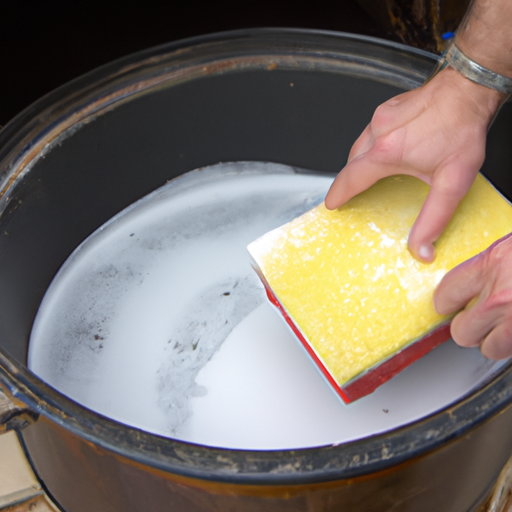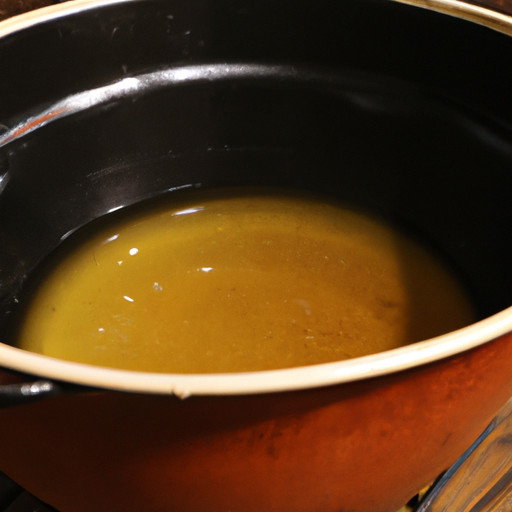CookingEnthusiast123
These tips really helped me clean my Dutch oven effectively. Thanks!

Before you begin cleaning your Dutch oven, it is important to gather the necessary supplies. You will need mild dish soap, a non-abrasive sponge or cloth, hot water, and a soft-bristle brush. It is also advisable to have a dedicated brush or scraper for removing stubborn food residues without damaging the seasoning.
To remove any food residues stuck to the surface of your Dutch oven, start by filling it with warm water and adding a few drops of dish soap. Let it soak for about 15-20 minutes to loosen the food particles. Use a non-abrasive sponge or cloth to gently scrub the interior and exterior of the Dutch oven. For stubborn residues, use a soft-bristle brush or a dedicated scraper to avoid scratching the seasoning.
If your Dutch oven has stubborn stains or burnt-on food, you can create a paste using baking soda and water. Apply the paste to the stained areas and let it sit for a few minutes. Then, gently scrub the stains using a soft-bristle brush or sponge. Rinse thoroughly with warm water to remove any residue. Avoid using harsh chemicals or abrasive cleaners, as they can damage the seasoning and the enamel coating.
After cleaning, it is crucial to thoroughly dry your Dutch oven to prevent rust. Use a clean towel or paper towels to remove any excess moisture. Place the Dutch oven on a stovetop or in a warm oven for a few minutes to ensure complete drying. Once dry, it's time to season your Dutch oven. Seasoning helps to maintain the non-stick surface and protect the cast iron from rust. Apply a thin layer of vegetable oil or shortening to the entire surface, both inside and out. You can use a paper towel or your fingers to evenly distribute the oil. Place the Dutch oven upside down in an oven preheated to 350°F (175°C) and let it bake for about an hour. This process will create a protective layer and enhance the natural non-stick properties of your Dutch oven.
Proper storage is essential to keep your Dutch oven in good condition. After seasoning and cooling, store your Dutch oven in a dry and well-ventilated area. Avoid stacking other cookware on top of it, as this can cause damage. If you need to stack multiple Dutch ovens, place a layer of paper towels or a silicone mat between them to prevent scratching. It is also recommended to periodically check your Dutch oven for any signs of rust or damage and re-season it if necessary.

| Cleaning Method | Suitable for | Effectiveness |
|---|---|---|
| Soaking with dish soap and scrubbing | Regular cleaning | Effective for general cleaning |
| Using baking soda paste | Stubborn stains and burnt-on food | Effective for removing tough stains |
| Seasoning with oil | Maintaining non-stick surface | Essential for preventing rust and enhancing cooking performance |
By following these cleaning and maintenance steps, you can ensure that your Dutch oven remains in excellent condition for years to come. Proper care will not only prolong its lifespan but also enhance its cooking performance, allowing you to enjoy delicious meals for many memorable gatherings.
CookingEnthusiast123
These tips really helped me clean my Dutch oven effectively. Thanks!
OutdoorChef456
As someone who loves outdoor cooking, this article provided valuable information on cleaning and maintaining my Dutch oven. Highly recommended!
FoodieFan789
The cleaning methods mentioned are quite standard, but still useful for beginners.
HomeCook101
I had some stubborn stains on my Dutch oven, and the baking soda paste method worked like magic! Thank you!
KitchenQueen321
I learned a lot about proper Dutch oven care from this article. The seasoning tips were especially helpful!
|
|
Audreanne Waelchi is a culinary enthusiast with years of experience in cooking with Dutch ovens. As an avid outdoor cook and Dutch oven aficionado, she has perfected the art of cleaning and maintaining Dutch ovens. Through her expertise, Audreanne aims to share her knowledge and help others make the most out of their Dutch oven cooking adventures. |